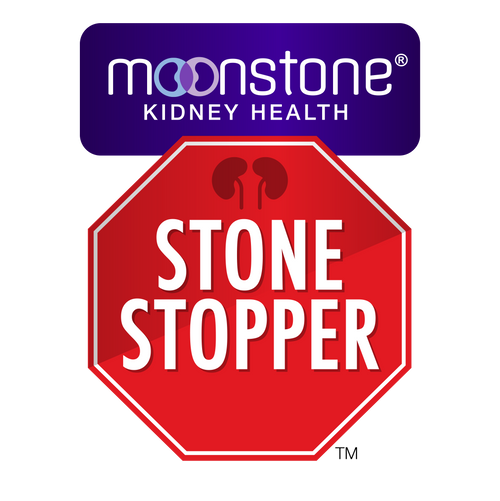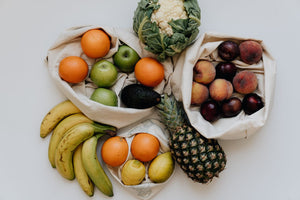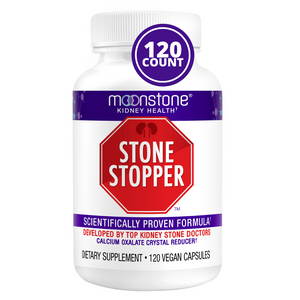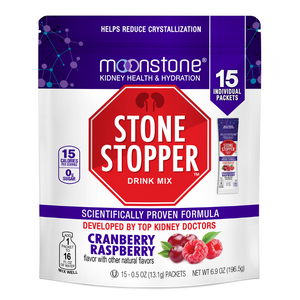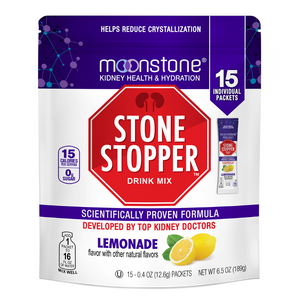Kidney stones can be painful and inconvenient, but did you know that your diet can play a major role in preventing them? One key component of a kidney stone prevention diet is reducing your intake of oxalates. In this blog post, we'll provide you with tips and tricks for shopping for an oxalate-friendly diet to help keep kidney stones at bay.

Understanding Oxalates:
Oxalates are naturally occurring compounds found in many foods, as well as being produced by the body. These compounds are normally filtered out of the blood through the kidneys and excreted in the urine. When there are too many oxalates in the body, however, or when the kidneys are not functioning properly, oxalates can build up in the urine and form crystals which lead to kidney stones.
It's important to speak with your doctor about preventing kidney stones (especially regarding diet changes, supplements and medications). Steps include drinking plenty of water, ensuring adequate intake of calcium (which can help bind to oxalates in the gut and prevent their absorption), consuming alkali citrate (found in our Moonstone Stone Stopper products), and lowering your intake of oxalate-rich foods. It's also advisable to know how to shop for an Oxalate-friendly diet.
Every person absorbs oxalates differently, so your recommended daily oxalate intake will vary on a number of factors (e.g.: age, gender, lifestyle, etc.). A good general rule of thumb, however, is to aim for less than 40-50 milligrams of oxalates per day.
While there are other risk factors that increase the chances of kidney stone formation (e.g.: family history, certain medical conditions, certain medications), the food we consume is easily within our control. Foods can be lumped into four categories when it comes to their oxalate content:
- Very High: more than 100mg per serving
- High: 26-99 mg per serving
- Moderate: 10-25 mg per serving
- Low: 5-9 mg per serving
Very High & High-Oxalate Foods: Diet Tips
If you're a fan of spinach, rhubarb, rice bran, almonds, miso soup, corn grits, and baked potatoes, these are unfortunately some of the worst foods to consume when it comes to oxalates. As you can see from the above graphs, these foods can reach as high as 755 mg/serving size! You can also read our blog post detailing more of these high-oxalate foods that cause kidney stones.
Some foods that are considered high or very high in oxalates are especially popular with health-conscious individuals who work-out. Understanding the connection between weight-lifting and high-intensity workouts with the increased risk of kidney stones is more complicated, however, so please check out our blog post on what every gym-goer should know.
But even if you're a fan of these foods, it doesn't necessarily mean you need to cut them out of your diet completely. It's important to how to to shop for an Oxalate-friendly diet. Keep reading to find out how you can combat this, as well as checking out this TikTok video of our urologist Dr Arnold Sholder discussing some dietary tips for calcium oxalate kidney stones.
@moonstonestonestopper Urologist Dr. Arnold Sholder: Dietary tips for calcium oxalate KIDNEY STONES❗️ Follow along for more kidney health info. #trymoonstone #kidneyhealth #worstpainever #kidneystone #kidneyhealth #calciumoxalate #diet #diettips #urologist #doctor #doctors ♬ original sound - MoonstoneStoneStopper
Moderate-Oxalate Foods
While not as high as other foods, moderate-oxalate foods still need to carry some concern. As a reminder, foods in this group can reach 25 mg of oxalates per serving, and the general rule of thumb is to consume no more than 40 mg each day.
Such foods in this category include:
- Vegetables (raw): fava beans, avocados, celery, olives, brussels sprouts, carrots
- Fruits: dates, dried figs, kiwi
- Grains and starches: brown rice (cooked), all-purpose flour, muesli, couscous
- Beverages: soy milk, V8 juice, tea, tomato juice
- Nuts and seeds: pumpkin seeds, kidney beans, pistachios, tahini
This group also includes such common meals as burgers (veggie and beef), lasagna, pancakes, potato chips, some cereals, and more! To view a list of moderate to very high oxalate foods, check out this Google Sheet from the University of Chicago detailing foods, their serving sizes and the mg/serving.

Planning Oxalate-Friendly Meals
Some foods are naturally low in oxalates or contain none at all. Such fruits like apples and bananas, vegetables like cauliflower and zucchini, grains like white rice and oat bran, proteins like eggs and fish, dairy products like yogurt and cheese, beverages like coffee and water, as well as flavorful herbs and spices to add to any meal like cinnamon and black pepper all contain little to no oxalates.
You can also follow such diets as the Renal Diet to prevent kidney stones, and stay away from such diets as Keto that increase your chances of kidney stone formation. But sometimes it's best to take a different approach. Many dietitians are actually urging people to stop 'dieting' (restricting yourself) and instead add other foods to your meals. Some ideas as it relates to oxalate-rich foods might include:
- If you're making a morning smoothie, accompany your raspberries and spinach with strawberries, blueberries, and Greek yogurt
- We all love potatoes, but instead of pure mashed potatoes add in some mashed cauliflower
- Sweet treats at the end of the day are always a favorite, but instead of plain chocolate accompany it with a banana and cherries
Instead of cutting certain foods out completely, you can combine them to help lower the risk of kidney stone formation. But always make sure to consult your doctor before any significant changes to your diet or daily routine.

